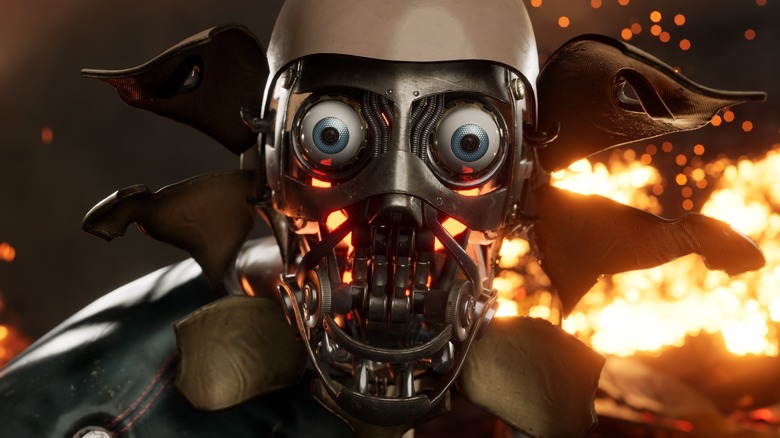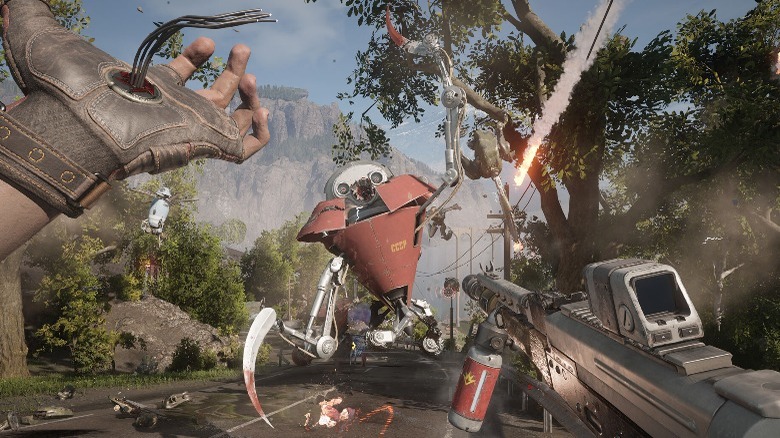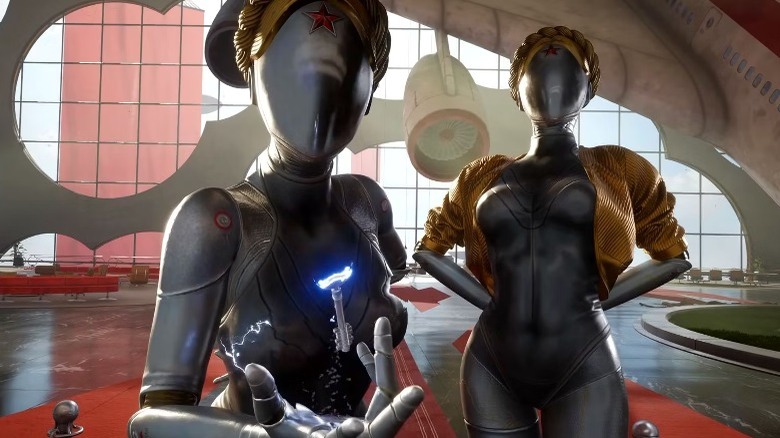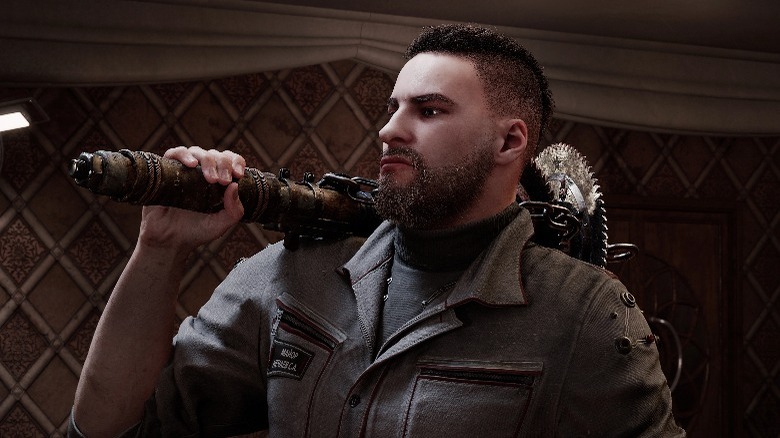Is Atomic Heart A Worthy Successor To BioShock?
"Atomic Heart" is the first title by development studio Mundfish. A lot of discourse about the sci-fi horror shooter has been mixed. Much of the discussion has revolved around fans comparing it to the 2K action horror title, "BioShock," which does appear to have influenced the game. There are numerous focal points for this comparison. Both franchises involve first-person shooting and melee mechanics, technologically enhanced abilities, alternate historical settings, striking visuals, and heavily political settings and themes.
The "BioShock" games explore economic and sociological philosophy in addition to some pretty heavy ideas about genetics, quantum physics, and the multiverse theory. These loaded themes, along with the creepy, yet awe-inspiring setting and visceral gameplay are just a few of the reasons why the BioShock franchise is considered one of the best among its generation.
It's not easy living up to such a high bar, but it feels like the similarities between "Atomic Heart" and "BioShock" make the comparison impossible to ignore. It's starting to look like "BioShock 4" might never happen, meaning there might be room for a new franchise to take the reins. This has led many fans to wonder if "Atomic Heart" is a worthy successor to 2K's iconic franchise.
Gameplay isn't quite on par
One of the easiest ways to compare "Atomic Heart" to "BioShock" is by looking at the combat mechanics. The protagonist, P-3, starts the game with a sentient polymer glove named Charles. This eventually gains the ability to give P-3 an array of supernatural powers that work very similarly to the way plasmids and vigors worked in "BioShock," adding a layer of elemental bombast to the otherwise straightforward shooting mechanics.
Unfortunately, many critics have reported that the abilities that Charles offers lack some of the oomph that players get from plasmids in the "BioShock" franchise. "'BioShock' starts you off with a wrench and an electric shock attack called electro bolt, and 'Atomic Heart' does more or less the same but with an axe," writes Rich Stanton of PCGamer. "The difference is that 'Atomic Heart”s electric shock feels... well, like it's just giving things a tickle." Plasmids gave players a sense of impact when they were used, especially when they found creative ways to use specific elements to distract enemies, trap them, or target their weaknesses. By contrast, the glove abilities in "Atomic Heart" feel underpowered and less useful.
Gameranx's Jake Baldino likewise felt that the melee attacks also lacked a sense of weight, but found the regular shooting mechanics were much more satisfying. Other critics have noted that there are some unique twists to the more futuristic weapons on offer in the game, but that combat can often feel repetitive and drawn out. This seems like a decent attempt for a new studio, but a significant step down from the immensely satisfying combat found in "BioShock."
Setting is great, but the story is weak
The world that "Atomic Heart" takes place in is a fascinating one, and it's arguably one of the stronger aspects of the game. It's set in an alternate timeline where the Soviet Union survived the Cold War and focused a major portion of its industry on robotics. In this retro-themed alternate future, automata are commonplace, performing menial labor tasks so that the human population can pursue more fulfilling roles in society. Of course, the player quickly finds out that the façade of this seemingly utopian paradise is actually built on less-than-stable foundations, resulting in many of these robots turning on their creators. This feels reminiscent of the origin stories for both Rapture from the first two "BioShock" games and the floating city of Columbia from "BioShock Infinite."
"'Atomic Heart”s premise is one of its most intriguing elements," states Connor Trinske of Game Informer. "Sadly, the actual plot is also a major letdown. Most of it is told through abrupt info-dumps, which quickly erodes any sense of mystery and makes all the events incredibly predictable." He also went on to note that the game is guilty of "clumsily rehashing many of 'BioShock”s themes with a Soviet spin."
Other reviewers seemed to agree. Destructoid's CJ Andriessen called it, "a rather basic tale of people in power trying to tighten their control of the world with P-3 standing in the middle." This is certainly disappointing given that the world-building in the game is so intriguing. It definitely seems to come up short when compared to the narratives found in the "BioShock" franchise, which have been the subject of numerous scholarly articles dedicated to analyzing the complex themes discussed in the games.
P-3 is a rough protagonist
Many of the larger complaints levied against "Atomic Heart" have to do with its protagonist. P-3 is a Major in the Soviet military who, along with his glove Charles, is charged with investigating Facility 3826, which has lost control of the robots being manufactured there. This leads the Major down a rabbit hole of political and technological intrigue, but many have found P-3 to be a somewhat irritating lens to view the story through.
Matt Gardner of Forbes called him "a mostly one-dimensional hero with an inexplicable American accent" while Rock Paper Shotgun's James Archer complained that, "[b]arely a minute passes without a sweary rant or [snarky] quip, often in the form of attempted banter with the glove, and even the lines that don't undermine the rest of the game's tone fail to be endearing or funny." Baldino called P-3 a "cringelord," stating that he is "abrasive and annoying."
To be fair, the protagonists from the "BioShock" franchise were far from the most memorable aspects of the games. Booker DeWitt was revealed to be a more complex character at the end of "Infinite," but he, Jack, and Subject Delta all generally serve more as vehicles for the story throughout their respective games. Like P-3, they're dropped into an unfamiliar environment and expected to cope with fantastical events that they don't quite understand. Even so, none of them received the degree of backlash that P-3 has. It seems that the main issue isn't that P-3 isn't a sufficiently complex or well-developed character, but simply that audiences find his dialogue to be grating. P-3 offers very little insight or understanding of what's going on around him. He mostly just complains ... loudly.
Visual design is its best quality
The "BioShock" franchise always hit home with its visuals. Looking out the window in the underwater city of Rapture or using the skyhook to glide over Columbia never failed to be an awe-inspiring experience. Everything from the monsters to the town squares was thoughtfully crafted and full of environmental storytelling cues for the player to find. This is one area where critics seem to agree that "Atomic Hearts" is pretty successful as well. The opening scenes of the futuristic city in the sky is a cinematic experience that feels worthy of a AAA title and the creative designs of the technology featured in the game are absolutely stunning.
Luke Reilly of IGN called this aspect of the game its "most remarkable element." He paid particular praise to the various robots featured in the game, from the giant battle mechs to the less ostentatious, but equally creative, service bots that can be seen sweeping the streets. He stated that its "outstanding aesthetic also extends to its large range of partially ruined labs, facilities, and transportation hubs — each filled with long, snaking globules of the liquid polymer that powers the advancements of this fantastical 1950s." This extends to other aspects of the game like the weapons and glove abilities, which might not feel quite as good as they would in a "BioShock" title but still manage to look incredible.
It's clear that Mundfish had some strong visual direction from the very start. This appears to be one arena, at least, where "Atomic Heart" lives up to the standards that "BioShock" has set for games in the genre -– though fans of 2K's franchise may find that it doesn't live up to the comparison in other areas.





